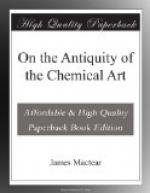In Vol. VIII. of the Journal of Education we find a notice that “Professor Dietz, of the University of Koenigsberg, who had spent five years of his life in visiting the principal libraries of Germany, Italy, Switzerland, Spain, France, and England, in search of manuscripts of Greek, Roman, and Oriental writers on medicine, is now engaged in publishing his ‘Analecta Medica.’
“The work contains several interesting papers on the subject of physical science among the Indians and Arabians, and communicates several introductory notices and illustrations from native Eastern writers. Dietz proves that the late Greek physicians were acquainted with the medical works of the Hindus, and availed themselves of their medicaments; but he more particularly shows that the Arabians were familiar with them, and extolled the healing art, as practised by the Indians, quite as much as that in use among the Greeks.
“It appears from Ibn Osaibe’s testimony (from whose biographical work Dietz has given a long abstract on the lives of Indian physicians), that a variety of treatises on medical science were translated from the Sanscrit into Persian and Arabic, particularly the more important compilations of Charaka and Susruta, which are still held in estimation in India; and that Manka and Saleh—the former of whom translated a special treatise on poisons into Persian—even held appointments as body-physicians at the Court of Harun-al-Raschid.”
As the age of the medical works of Charaka and Susruta is incontestably much more ancient than that of any other work on the subject (except the Ayur Veda)—as we shall see when we come to consider the science of the Hindoos—this in itself would be sufficient to show that the Arabians were certainly not the originators of either medical or chemical science.
We should not forget that it is only to their own works and their translations, chiefly by the Greeks, we owe our knowledge of the state of Arabian science, and that it is only in rare cases that we have given a list of works consulted, so that we can gather the sources from which their knowledge was derived. It would scarcely be imagined, from reading the works of Roger Bacon, or of Newton, that they had derived some, at least, of their knowledge from Arabian sources; and yet such is known to have been the case with them both.
Let us now glance backwards from the Arabians to the Greeks.
It is supposed that the first translations from the Greek authors were made for the Caliphs about 745 A.D., and were first translated into Syriac, and then into Arabic. The works of Aristotle, Euclid, Ptolemy, Hippocrates, Galen, and Dioscorides are known to have been translated under the reign of Al-Mansour.




